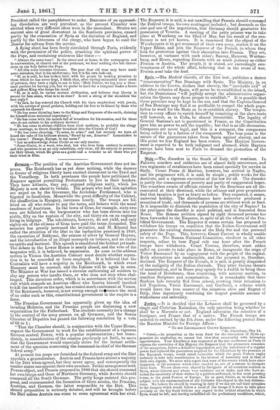&LIMIT — The position of the Austrian Government does not im- prove.
The Reichsrath has as yet done nothing, while the decrees in favour of religious liberty have excited discontent in the Tyrol and the Vorarlberg. In both provinces the people have petitioned the Emperor against permitting Protestants to live in their borders. 'They have hitherto, they say, enjoyed religious unity, which his Majesty is now about to violate. The priests who lead this agitation are urged on by the Governor, the Archduke Ferdinnand, who is bigoted to fanaticism. Meanwhile the great difficulty of the Cabinet, the disaffection in Hungary, increases hourly. The troops are bil- leted on all who refuse to pay the taxes, and behave with the usual insolence of Austrians. In the town of Gran, for example, sixty-two men are billeted on the burgomaster who has been driven into his stable, fifty on the captain of the city, and thirty-six on an engineer living in lodgings. The inhabitants, however, do not yield, and only eighty-six of the citizens of Gran have paid the taxes demanded. The measure has greatly increased the irritation, and M. Klauzal has called the attention of the Diet to the barbarities practised in 1848, the execution of Bathyani, the seizure of silver by General Haynau, and the introduction of an illegal monopoly on tobacco, and an excise on spirits and beetroot. This speech is considered the boldest yet made. The debate in the Lower House is nearly closed, and the vote of the magnates will,, it is believed, be unanimous. As soon as the address arrives in Vienna the Austrian Cabinet must decide whether separa- tion is to be conceded or force employed. It is believed that the Centralists will have a majority in the Reichsrath, in which event Hungary must be coerced, and the Italians will be again in arms. The Minister at War has issued a circular authorizing all soldiers to slay any person who insults them, or who does not stop when chal- lenged. This atrocious order, which is in accordance with the service rule which compels an Austrian officer who fancies himself insulted to kill the insulter on the spot, has created much excitement at Vienna. If the Reichsrath, however, is not strong enough totrocure the recal of an order such as this, constitutional government in the empire is a farce. The Prussian Government has apparently given up the idea of invading Holstein, and the Prussian people are discussing a new organization for the Fatherland. The absolute necessity for a change in thecontrol of the army presses on all Germans, and the Saxon Chamber of Deputies has passed the following resolution by a vote of 62 to 1:
"That the Chamber should, in conjunction with the Upper House, request the Government to work for the establishment of a vigorous German central Power, with a popular representation; but imme- diately, in consideration of the reasons previously set forth, to move that the Government would especially strive for the instant settle- ment of the question concerning the command-in-chief of the German federal army."
At present ten corps are furnished to the federal army and the Diet appoints a generalissimo. Austria and Prussia have almost a majority in the Diet when agreed, but they never agree, and consequently the smaller states can appoint their own nominee. Tothis arrangement both Powers object, and -Prussia proposed in 1860 that she should command her own troops and those of Northern Germany, while Austria should command all the South Germans. The petty kings resisted this pro- posal, and recommended the formation of three armies, the Prussian, Austrian, and German, the latter responsible to the Diet. This absurd proposition is seriously debated, and will be brought before the Diet unless Austria can come to some agreement with her rival. The Emperor, it is said, is not unwilling that Prussia should command. the Federal troops, his own contingent included; but demands as the sine gad non of the negotiation, that Germany should guarantee his possession of Venetia. A meeting of the petty princes was to take place at Wurzburg on the 22nd of May, but the result of the con- ference is not yet known. It is rumoured that the object of the
i
Wurzburgers is to get command of their own army, station it on the Upper Rhine, and join the Emperor of the French, to whom they look for protection against their absorption into Prussia. They are, however, at variance with each other; Saxony, Hanover, Wurtem- burg, and Hesse, regarding Bavaria with as much jealousy as either Prussia or Austria. The people, it is stated, are exceedingly con- temptuous of the whole affair, believing that in the event of war, Prussia must take the lead.






























 Previous page
Previous page